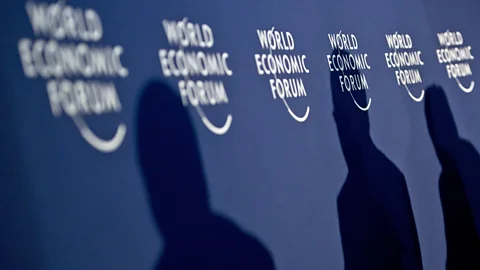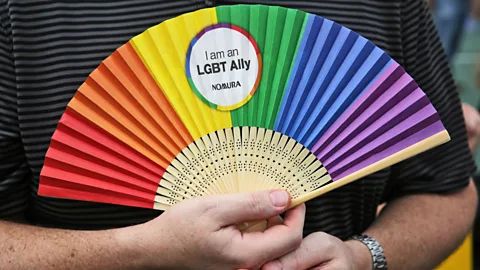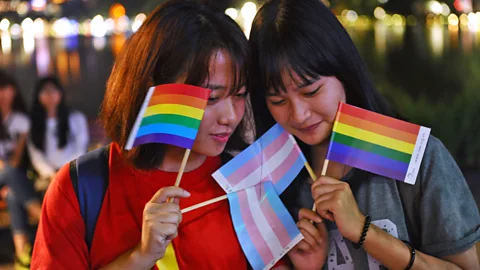How a once taboo topic came out from the shadows at Davos
 Getty Images
Getty ImagesAt the gathering of the world’s most elite and powerful, LGBT issues have finally graduated from private discussions on the fringe to the annual meeting agenda.
The last couple of years have been big ones for bringing Lesbian Gay Bisexual and Transgender issues to the fore. We’ve seen the legalisation of same sex marriage in the US and parts of Latin America and Europe and an increasing number of high profile leaders speaking openly about being gay, like Apple’s Tim Cook, and a greater public presence from the LGBT community on screen and stage, sports and in politics.
At the same time the recent debate within the Anglican Church around same sex marriage hit a sour note and the plight of LGBT people in other parts of the world has deteriorated conspicuously.
It is against this backdrop, that LGBT issues have made it onto the official agenda of the World Economic Forum in Davos for the first time. LGBT issues have been slowly making an appearance in the past couple of years, with the topic touched on in private discussions behind closed-doors as part of what I call the Davos Fringe and passing mentions on Davos panels around more general discussions of diversity and inclusion.
Topics don’t get added to the agenda lightly. New issues must have global importance and there must be high profile senior executives willing to talk about them on a pubic stage. The 2016 agenda includes two public sessions with a clear LGBT focus, signalling that LGBT issues have come to the fore with champions who are ready to speak clearly and openly on the topic.
There is a feeling among parts of the business community that through their global presence, with strong policies across their entire workforces around the world, and the ability to use their economic clout to influence governments, they can play a positive role either through acting as a role model or by using their soft power to encourage greater levels of acceptance and equal rights for LGBT people in countries where rights are not enshrined.
One session, Bridging the Diversity Divide, will look at how companies can support the LGBT agenda to promote a more diverse workforce and inclusive corporate culture. The discussion will cover how companies can make their businesses more LGBT-friendly, including encouraging visible LGBT role models and ambassadors inside and outside of companies, highlighting pathways for career progression, and decoding biases through open discussions and clear human resource guidelines that ensure that the entire workforce knows that intolerance will not be tolerated. In addition, there is a suggestion to work with local LGBT groups to create tailored programmes that balance cultural and policy approaches.
 Getty Images
Getty ImagesThe second session at Davos delves into more complex territory: LGBT issues in emerging markets. The Diversity Barriers in Emerging Markets discussion will focus on the leadership and personnel challenges for multinational corporations tackling discriminatory norms and even laws that disadvantage the LGBT community in emerging economies.
That means looking not only at what it means to confront everyday bias in the workplace, but also the role global businesses play in protecting their workforce and encouraging change when they operate in countries that are not as welcoming, or even openly hostile, to the LGBT community.
Issues around recruitment, retention, and making the work environment an accepting and welcoming one for those in the LGBT community have been a topic of interest in the business world for a while, but increased prominence at Davos and on the world stage has the potential to give the issue even greater visibility. To bring more focus to the issue, the WEF is also publishing blog posts on the topic
 Getty Images
Getty Images“By putting LGBT issues at the forefront of the Davos agenda, we’re sending a message that we’re serious about tackling LGBT rights in the workplace,” said Fon Mathuros, senior director, WEF.
The WEF’s research around the issue found a clear correlation between countries that have adopted progressive policies towards empowering LGBT people and countries that score highly in terms of economic competitiveness. They attribute the connection to the benefits of such companies’ ability to attract and retain talent from the widest possible pool of candidates.
“For LGBT inclusion to be recognised and discussed as an economic opportunity for companies and countries [at Davos] gives it the importance it deserves,” said Beth Brooke-Marciniak, a recognised champion of LGBT issues, and global vice chair of policy of accountancy firm Ernst and Young . “One thing we have learned over and over again… is that progress on issues starts with dialogue and understanding. And there is no better place to begin the global dialogue than Davos.”
Brooke-Marciniak thinks that companies can play a role in making that connection and working with countries to propel progress.
“Multinational companies have enormous economies and employ millions of people, this gives them the ability to influence change on this issue in a unique and powerful way,” she said. “If the private sector is leading inclusive cultures within the walls of their companies, they can lead the cultural change in society to create a more inclusive society.”
 Getty Images
Getty ImagesHaving high profile global firms take the initiative across a variety of sectors can help effect change. Brad Smith, Microsoft’s president and chief legal officer said, “having [LGBT equality] on the formal agenda for the first time really matters.” That’s one reason EY and Microsoft will be hosting a private breakfast at Davos, focused on LGBT issues in business for Davos attendees. Accenture will also be hosting an event, which will be webcast from Davos.
Inga Beale, CEO, Lloyd’s of London, who is speaking on the Bridging the Diversity Divide panel, acknowledges that there is a long road ahead to reach equality. “My vision is to one day see a world where LGBT is no longer a category, a world where all sexual orientations are equal,” she said.
Businesses are beginning to recognise that LGBT issues need special efforts to ensure they are addressed properly in the workplace. Discussing recruitment, retention, and fair treatment of LGBT employees and the community at large at the highest level at a place like Davos is a big step forward. The hope is that companies and governments around the world will follow up with concrete steps paving the way for real change.
To follow BBC Capital’s Davos coverage or to comment on this story or anything else you have seen on BBC Capital, please head over to our Facebook page or message us on Twitter.
Lucy Marcus is an award winning writer, board chair and non-executive director of several organisations. She is also the CEO of Marcus Venture Consulting. Follow her Davos coverage for BBC Capital here and on Twitter @LucyMarcus.
